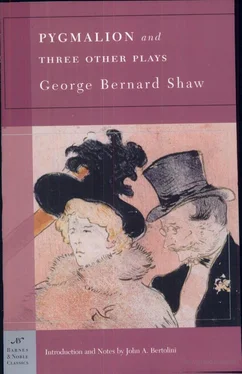As our own instincts are not appealed to by her conclusion, let us see whether we cannot discover some reason in it. When Higgins excused his indifference to young women on the ground that they had an irresistible rival in his mother, he gave the clue to his inveterate old-bachelordom. The case is uncommon only to the extent that remarkable mothers are uncommon. If an imaginative boy has a sufficiently rich mother who has intelligence, personal grace, dignity of character without harshness, and a cultivated sense of the best art of her time to enable her to make her house beautiful, she sets a standard for him against which very few women can struggle, besides effecting for him a disengagement of his affections, his sense of beauty, and his idealism from his specifically sexual impulses. This makes him a standing puzzle to the huge number of uncultivated people who have been brought up in tasteless homes by commonplace or disagreeable parents, and to whom, consequently, literature, painting, sculpture, music, and affectionate personal relations come as modes of sex if they come at all. The word passion means nothing else to them; and that Higgins could have a passion for phonetics and idealize his mother instead of Eliza, would seem to them absurd and unnatural. Nevertheless, when we look round and see that hardly anyone is too ugly or disagreeable to find a wife or a husband if he or she wants one, whilst many old maids and bachelors are above the average in quality and culture, we cannot help suspecting that the disentanglement of sex from the associations with which it is so commonly confused, a disentanglement which persons of genius achieve by sheer intellectual analysis, is sometimes produced or aided by parental fascination.
Now, though Eliza was incapable of thus explaining to herself Higgins’s formidable powers of resistance to the charm that prostrated Freddy at the first glance, she was instinctively aware that she could never obtain a complete grip of him, or come between him and his mother (the first necessity of the married woman). To put it shortly, she knew that for some mysterious reason he had not the makings of a married man in him, according to her conception of a husband as one to whom she would be his nearest and fondest and warmest interest. Even had there been no mother-rival, she would still have refused to accept an interest in herself that was secondary to philosophic interests. Had Mrs. Higgins died, there would still have been Milton and the Universal Alphabet. Landor’s remark that to those who have the greatest power of loving, love is a secondary affair, would not have recommended Landor to Eliza. Put that along with her resentment of Higgins’s domineering superiority, and her mistrust of his coaxing cleverness in getting round her and evading her wrath when he had gone too far with his impetuous bullying, and you will see that Eliza’s instinct had good grounds for warning her not to marry her Pygmalion.
And now, whom did Eliza marry? For if Higgins was a predestinate old bachelor, she was most certainly not a predestinate old maid. Well, that can be told very shortly to those who have not guessed it from the indications she has herself given them.
Almost immediately after Eliza is stung into proclaiming her considered determination not to marry Higgins, she mentions the fact that young Mr. Frederick Eynsford Hill is pouring out his love for her daily through the post. Now Freddy is young, practically twenty years younger than Higgins: he is a gentleman (or, as Eliza would qualify him, a toff), [232] Slang for a member of the upper class whose clothes indicate his status.
and speaks like one; he is nicely dressed, is treated by the Colonel as an equal, loves her unaffectedly, and is not her master, nor ever likely to dominate her in spite of his advantage of social standing. Eliza has no use for the foolish romantic tradition that all women love to be mastered, if not actually bullied and beaten. “When you go to women,” says Nietzsche, “take your whip with you.” Sensible despots have never confined that precaution to women: they have taken their whips with them when they have dealt with men, and been slavishly idealized by the men over whom they have flourished the whip much more than by women. No doubt there are slavish women as well as slavish men; and women, like men, admire those that are stronger than themselves. But to admire a strong person and to live under that strong person’s thumb are two different things. The weak may not be admired and hero-worshipped; but they are by no means disliked or shunned; and they never seem to have the least difficulty in marrying people who are too good for them. They may fail in emergencies; but life is not one long emergency: it is mostly a string of situations for which no exceptional strength is needed, and with which even rather weak people can cope if they have a stronger partner to help them out. Accordingly, it is a truth everywhere in evidence that strong people, masculine or feminine, not only do not marry stronger people, but do not shew any preference for them in selecting their friends. When a lion meets another with a louder roar “the first lion thinks the last a bore.” The man or woman who feels strong enough for two, seeks for every other quality in a partner than strength.
The converse is also true. Weak people want to marry strong people who do not frighten them too much; and this often leads them to make the mistake we describe metaphorically as “biting off more than they can chew.” They want too much for too little; and when the bargain is unreasonable beyond all bearing, the union becomes impossible: it ends in the weaker party being either discarded or borne as a cross, which is worse. People who are not only weak, but silly or obtuse as well, are often in these difficulties.
This being the state of human affairs, what is Eliza fairly sure to do when she is placed between Freddy and Higgins? Will she look forward to a lifetime of fetching Higgins’s slippers or to a lifetime of Freddy fetching hers? There can be no doubt about the answer. Unless Freddy is biologically repulsive to her, and Higgins biologically attractive to a degree that overwhelms all her other instincts, she will, if she marries either of them, marry Freddy.
And that is just what Eliza did.
Complications ensued; but they were economic, not romantic. Freddy had no money and no occupation. His mother’s jointure, [233] Condition of marriage whereby a widow can draw income from her husband’s estate.
a last relic of the opulence of Largelady Park, had enabled her to struggle along in Earlscourt with an air of gentility, but not to procure any serious secondary education for her children, much less give the boy a profession. A clerkship at thirty shillings a week was beneath Freddy’s dignity, and extremely distasteful to him besides. His prospects consisted of a hope that if he kept up appearances somebody would do something for him. The something appeared vaguely to his imagination as a private secretaryship or a sinecure of some sort. To his mother it perhaps appeared as a marriage to some lady of means who could not resist her boy’s niceness. Fancy her feelings when he married a flower girl who had become de classee under extraordinary circumstances which were now notorious !
It is true that Eliza’s situation did not seem wholly ineligible. Her father, though formerly a dustman, and now fantastically dis classed, had become extremely popular in the smartest society by a social talent which triumphed over every prejudice and every disadvantage. Rejected by the middle class, which he loathed, he had shot up at once into the highest circles by his wit, his dustmanship (which he carried like a banner), and his Nietzschean transcendence of good and evil. At intimate ducal dinners he sat on the right hand of the Duchess; and in country houses he smoked in the pantry and was made much of by the butler when he was not feeding in the dining-room and being consulted by cabinet ministers. But he found it almost as hard to do all this on four thousand a year as Mrs. Eynsford Hill to live in Earlscourt on an income so pitiably smaller that I have not the heart to disclose its exact figure. He absolutely refused to add the last straw to his burden by contributing to Eliza’s support.
Читать дальше












